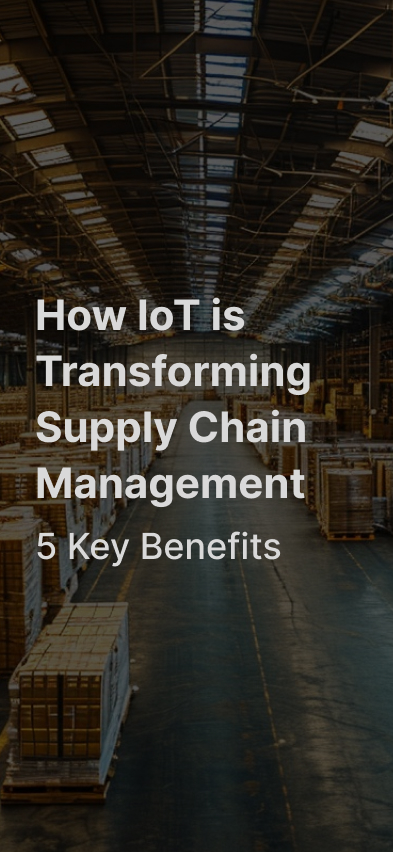

In today’s fast-paced business landscape, supply chain management has become a critical component for organizations to maintain a competitive edge. The Internet of Things (IoT) has emerged as a game-changer, revolutionizing the way supply chain operations are managed. IoT refers to the interconnected network of physical devices, sensors, and software that enable data exchange and automated decision-making processes.
IoT in supply chain management involves the deployment of various sensors, RFID tags, and other connected devices throughout the entire supply chain network. These devices collect and transmit data related to inventory levels, asset locations, environmental conditions, and more, enabling you to monitor and manage your supply chain operations with unprecedented precision.
IoT technologies have the potential to streamline and automate various supply chain processes, leading to increased efficiency and productivity. For instance, IoT-enabled inventory management systems can automatically trigger reorder notifications when stock levels reach predefined thresholds, minimizing the risk of stockouts and ensuring optimal inventory levels.
Furthermore, IoT-powered warehouse management systems can optimize picking, packing, and shipping processes, reducing manual labor and minimizing errors. By automating repetitive tasks and leveraging real-time data, you can significantly improve the overall efficiency of your supply chain operations.
One of the most significant advantages of IoT in supply chain management is the ability to leverage real-time data analytics. IoT devices generate vast amounts of data, which can be analyzed and transformed into actionable insights using advanced analytics tools.
By harnessing the power of real-time data analytics, you can gain a comprehensive understanding of supply chain patterns, customer demand, and market trends. This knowledge empowers you to make informed decisions, optimize inventory levels, and respond quickly to changing market conditions, ultimately driving business growth and profitability.
IoT technologies can play a crucial role in predictive maintenance, helping you to identify potential equipment failures before they occur. By monitoring various parameters such as temperature, vibration, and performance data, IoT sensors can detect anomalies and alert you to potential issues.
Proactive maintenance not only minimizes costly downtime but also extends the lifespan of your equipment, reducing overall maintenance costs. This proactive approach ensures that your supply chain operations run smoothly, minimizing disruptions and enhancing overall efficiency.
By leveraging the power of IoT and the insights derived from real-time data analytics, you can optimize your entire supply chain network. IoT-enabled route optimization algorithms can help you identify the most efficient transportation routes, reducing fuel consumption and minimizing carbon emissions.
Additionally, IoT-powered inventory management systems can help you minimize excess inventory, reducing storage costs and minimizing the risk of obsolescence. By optimizing various aspects of your supply chain, you can achieve significant cost savings and improve your bottom line.
- Expertise and experience: Look for a provider with a proven track record in implementing IoT solutions for supply chain management. Evaluate their industry experience, certifications, and customer testimonials to ensure they have the necessary expertise to meet your specific requirements.
- Scalability and flexibility: As your business grows, your IoT solution should be able to scale seamlessly to accommodate increasing demands. Choose a provider that offers flexible and scalable solutions, ensuring that your investment remains future-proof.
- Security and data privacy: Data security and privacy should be a top priority when implementing IoT solutions. Evaluate the provider's security protocols, data encryption methods, and compliance with industry standards to safeguard your sensitive information.
- Integration capabilities: Seamless integration with your existing systems and applications is crucial for maximizing the benefits of IoT. Ensure that the provider offers robust integration capabilities and supports common industry standards and protocols.
- Support and maintenance: IoT solutions require ongoing support and maintenance to ensure optimal performance. Consider the provider's support offerings, including response times, training, and regular software updates.
Data management and integration
Security and privacy concerns
Interoperability and standardization
Change management and employee training
Cost and return on investment (ROI)
The integration of IoT technologies in supply chain management is no longer a luxury but a necessity for businesses seeking to remain competitive in today’s dynamic market. By embracing IoT, you can unlock a wealth of benefits, including improved visibility, enhanced efficiency, real-time data analytics, predictive maintenance, and supply chain optimization.
However, successfully implementing IoT in your supply chain requires careful planning, strategic partnerships, and a commitment to addressing potential challenges. By choosing the right IoT service provider, addressing security and data management concerns, and fostering a culture of innovation and continuous improvement, you can position your organization for long-term success in the era of digital transformation.
Take the first step towards supply chain excellence by scheduling a consultation today. Visit our website at or contact us at info@peopletech.com to learn more about how we can help you harness the power of IoT and drive sustainable growth for your business.
